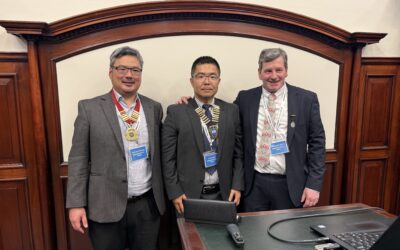Young Engineers Programme (YEP)
The YEP programme continues well at Aberdeen, with the seventh session, “Introduction to Fitness for Service Assessments” with Pieter Van Der Vyver from Oceaneering being held on 15th September, which was followed by George Winning, on Thursday 6th October 2022 on the topic of “Corrosion aspects of O&G Production Chemistry.”
During July (26/07/22) and August (24/08/22) respectively, there were excellent talks given by Clare Watt of KAEFER on “Corrosion Under Insulation and Fire Protection” and Jim McNab of Oceaneering entitled “Non-Destructive Testing and Corrosion Monitoring.”
The YEP participants are now in the final stages of their Case Study with the date of Thursday 24th November set for the YEP case study competition presentation evening, to be held at Aberdeen Palm Court Hotel. The Case Study set for the participants, who were divided into teams for this, was “Corrosion management of mature offshore platform facilities”, and Steve Paterson – Case Study Leader, gave the following essential information for the teams, so that they can analyse the data and perform a high-level corrosion risk assessment, in order to propose an integrity management plan. Also included in the case study is a subsea tie-back with H2S so that the teams can also do a materials selection for the pipeline and a sour service assessment for the platform facilities. The study is based on an actual N. Sea platform.
Brief: Each YEP team is assumed to have been engaged by an integrity services contractor to advise an international company that is a newcomer to the operation of production facilities in the UK sector of the North Sea. Capercaille Energy, which is an affiliate of Grouse Capital International, is considering the acquisition of an existing platform and associated subsea facilities that have been in operation for 15 years. End of field life is currently estimated to be 2032. There is an 8” subsea pipeline from the oil rim of a near field reservoir and a 10” subsea pipeline from the gas cap. Configuration of the subsea wells and manifolds means that individual well tests are not straightforward. As part of the purchase there is also an opportunity to develop another gas/condensate reservoir 10km from the platform. The reservoir is known to contain up to 50 ppm H2S. Initial studies suggest an 8” pipeline will be installed for the possible initial gas production of 50 MMscf/d. It has already been identified that the existing owner has not managed the integrity of the “Solaire” platform in an optimal way in the past, and there have been several significant corrosion related hydrocarbon leaks in recent years. The teams have also been made aware that inspection has been primarily time-based and many vessels have not been inspected since start of operation. Corrosion management has been the responsibility of a contractor who has not been helpful so far, and administration of the inspection database has been poor. Capercaille Energy is a demanding and sometimes difficult client with high expectations of its contractors. A more innovative approach to corrosion management of the platform is anticipated by the client. Run on shoe-string budget the company does not have the resources to chase the existing owner for anything but essential technical information about the platform and associated facilities. Each team will need to carefully consider what questions are asked to get a sensible and timely response. The integrity services contractor, Bala Integrity, has a habit of playing its sub-contractors off against each other and there may be other companies that have been engaged to provide advice. Each team should present their proposed solution to the management team of Bala Integrity prior to presenting to Capercaille Energy.
Platform details: Solaire is a six-legged steel jacket platform in the Central North Sea positioned in 90 metres of water. Current production is 40,000 bpd oil (API 40), 100 MMscf/d gas and 50,000 bpd produced water. It has two HP three phase sand separators, three further stages of oil/water/gas separation, plus two vertical 1st stage gas separators. There are multiple stages of gas compression, with a (TEG) glycol contactor for gas dehydration, and coolers for export gas.
There are produced water handling facilities for overboard discharge. Oil export (max 2% water) to shore is via a 16” pipeline and dry gas export to a 3rd party pipeline system is via an 18” pipeline. Personnel on board for the platform is limited to 80, which restricts the ability to do non-routine maintenance and inspection.
The exercise involves, 1. Identify what further information or data that you need for the other tasks in the exercise and request from your mentor. 2. Analyse/discuss the information and data that you are provided with. Identify any gaps in information and any assumptions you may need to make. 3. Perform a high-level risk assessment to identify key threats to the mechanical integrity of the pressurised systems (i.e. structural integrity is excluded). 4. Propose a systematic approach to manage the key threats including mitigation measures, corrosion control requirements, performance monitoring, the resources required to manage the process, and any specific strategies needed. 5. Propose materials of construction for a pipeline including welding consumables and any testing requirements to tie-back the new reservoir to the platform and explain the basis for the materials selection and how any corrosion threats will be mitigated. 6. Identify what needs to be done for the existing facilities should the new slightly sour reservoir be produced back to the platform. 7. Propose a strategy for convincing Capercaille Energy that your team’s approach is the optimal solution and that you are the right team to do the job.



